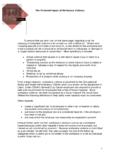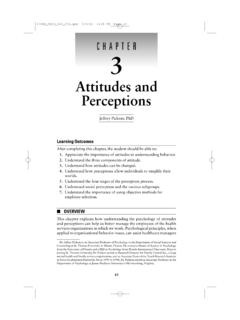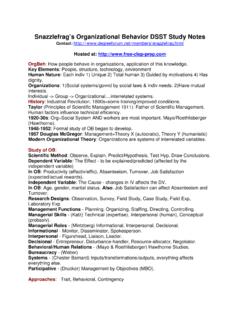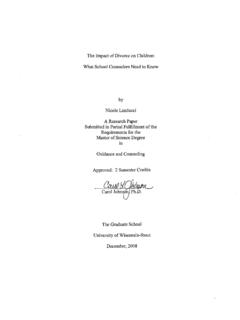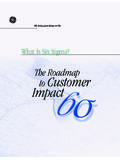Transcription of Karl E. Wiegers - Process Impact
1 Copyright 2002 by karl E. Wiegers . All Rights Peer Reviews1 karl E. WiegersProcess review an activity in which people other than the author of a software deliverableexamine it for defects and improvement opportunities is one of the most powerful softwarequality tools available. Peer review methods include inspections, walkthroughs, peer deskchecks,and other similar activities. After experiencing the benefits of peer reviews for nearly fifteenyears, I would never work in a team that did not perform , many organizations struggle to implement an effective review program. Manyof the barriers to successful peer reviews are social and cultural in nature, not technical. Thisarticle explores some of the social and psychological aspects of having people review eachother s work , ways to overcome resistance to reviews, and issues regarding managementinvolvement. The suggestions provided here might help your peer review program succeedwhere others have Each Other s BackAsking your colleagues to point out errors in your work is a learned not instinctive behavior.
2 We all take pride in the work we do and the products we create. We don t like to admitthat we make mistakes, we don t realize how many we make, and we don t like to ask otherpeople to find them. Holding successful peer reviews requires us to overcome this naturalresistance to outside critique of our practitioners are sometimes reluctant to spend time examining a colleague s might be leery of a co-worker who asks for a review of his code. Questions arise: Does helack confidence? Does he want you to do his thinking for him? Anyone who needs their codereviewed shouldn t be getting paid as a software developer, scoff some potential reviewresisters. These resisters don t appreciate the value that multiple pairs of eyes can a healthy software engineering culture, team members engage their peers to improvethe quality of their work and increase their productivity. They understand that time spent lookingat a colleague s deliverable isn t time wasted, especially when other team members willinglyreciprocate.
3 The best software engineers I have known actively sought out reviewers, havinglearned early on how much they can help. Indeed, the input from many reviewers over theircareers was part of what made these developers the best at what they Weinberg introduced the concept of egoless programming in The Psychology ofComputer Programming, originally published in 1971 and re-released in 1998. Weinbergrecognized that people tie much of their perceived self-worth to their work . You can interpret afault that someone finds in an item you created as a shortcoming in yourself as a software 1 This paper was originally published in STQE, March/April 2002. It is reprinted (with modifications) withpermission from Software Quality Engineering. It is adapted from Peer Reviews in Software: A Practical Guide byKarl E. Wiegers (Addison-Wesley, 2002).
4 Humanizing Peer ReviewsPage 2 Copyright 2002 by karl E. Wiegers . All Rights , and perhaps even as a human being. To guard your ego, you don t want to knowabout all the errors you ve made, and you might rationalize possible bugs as product staunch ego-protection presents a barrier to effective peer review, leads to an attitude ofprivate ownership toward individual contributions within a team project, and can result in a poorquality product. Egoless programming enables an author to step back and let others point outplaces where improvement is that the term is egoless programming, not egoless programmer. Developersneed a robust enough ego to trust and defend their work , but not so much ego that they rejectsuggestions for better solutions. Similarly, the egoless reviewer should have compassion andsensitivity for his colleagues, if only because their roles will be reversed one broad peer review program can only succeed in a work culture that values quality in itsmany dimensions, including freedom from defects, satisfaction of customer needs and businessobjectives, timeliness of delivery, and the possession of desirable product functionality andattributes.
5 Recognizing that team success depends on helping each other do the best job possible,members of a healthy culture prefer to have peers not customers find defects. Theyunderstand that reviews are not meant to identify scapegoats for quality problems. Having a co-worker locate a defect is regarded as a good catch, not a personal failing. In fact, reviews canmotivate authors to practice superior craftsmanship because they know their colleagues willclosely examine their for the ReviewerThe dynamics between the reviewers and the work product s author are a critical aspectof peer reviews. The author must trust and respect the reviewers to be receptive to theircomments. Conversely, the reviewers must respect the author s talent and hard work . The waysin which reviewers speak to authors indicate whether their culture favors respectful collaborationor competitive should focus on what they observed about the product, thoughtfully selectingthe words they use to raise an issue.
6 Saying, I didn t see where these variables were initialized is likely to elicit a constructive response; the more accusatory You didn t initialize thesevariables might get the author s hackles up. You might phrase your comments in the form of aquestion: Are we sure that another component doesn t already provide that service? Or,identify a point of confusion: I didn t see where this memory block is deallocated. Direct yourcomments to the work product, not to the author. For example, say This specification is missingSection from the template instead of You left out section Reviewers and authors mustwork together outside the reviews, so each needs to maintain a level of professionalism andmutual respect to avoid strained a draft of my book Peer Reviews in Software was undergoing peer review(naturally!), one reviewer expressed a concern by writing, How in the world have you managedto miss some point he thought was important.
7 Then he added, Good grief, karl . I respect thisreviewer s experience and value his insights, but perhaps he could have phrased that bit offeedback more tactfully. Expressing incredulity at the author s lack of understanding is not likelyto make the author receptive to a reviewer s suggestion. While a reviewer might let aninappropriate comment slip out accidentally during a discussion, it s inexcusable in do not want your reviews to create authors who look forward to retaliating againsttheir tormentors. Moreover, an author who walks out of a review meeting feeling personallyHumanizing Peer ReviewsPage 3 Copyright 2002 by karl E. Wiegers . All Rights or professionally insulted will not voluntarily submit his work for review again. Bugsare the bad guys in a review, not the author or the reviewers. The leaders of the review initiativeshould strive to create a culture of constructive criticism, in which team members seek to learnfrom their peers and do a better job the next time.
8 Managers should encourage and reward thosewho initially participate in reviews and make useful contributions, regardless of the : Why Don t People Do Reviews?Lack of knowledge about reviews, cultural issues, and simple resistance to change (whichoften masquerades as excuses) contribute to the underuse of reviews. Many people don tunderstand what peer reviews are, why they are valuable, the differences between formal andinformal reviews, or when and how to perform them. Some developers and project managersdon t think their project is large enough or critical enough to need reviews, yet any piece of workcan benefit from an outside perspective. There s also a widely held perception that reviews taketoo much time and slow the project down. In reality, any technique that facilitates early qualityimprovements should shorten schedules, reduce maintenance costs, and enhance customersatisfaction.
9 The misperception that testing is always superior to manual inspection also leadssome practitioners to shun cultural issues can create unpleasant review experiences. The fear of managementretribution if defects are discovered can make an author reluctant to let others examine his cultural barrier is the reviewer s attitude that the author is the most qualified person towork on his part of the system who am I to look for errors in his work ? This is a commonreaction from new developers who are invited to review an experienced colleague s is also the paradox that many developers are reluctant to try a new method unless thetechnique has been proven to work , yet the developers don t believe the new approach worksuntil they ve successfully done it themselves. They don t want to take anyone else s word for biases that run deeper than workplace attitudes can play against reviewparticipation.
10 For instance, our educational system grades people primarily on individualperformance, so collaborating is sometimes viewed as cheating. There s an implication that ifyou need help, then you must not be very smart. Therefore, it s not surprising that developersoften resist asking for help through reviews. We have to overcome the ingrained culture ofindividual achievement and embrace the value of collaboration. In addition, authors who submittheir work for scrutiny might feel their privacy is being invaded, being forced to air the internalsof their work for all to see. This is threatening to some people, which is why the culture mustemphasize the value of reviews as a collaborative, nonjudgmental tool for improved quality there are the excuses. People who don t want to do reviews will expendconsiderable energy explaining why reviews don t fit their culture, needs, or time often appears as NAH (Not Applicable Here) Syndrome: we don t need no stinkin reviews.




